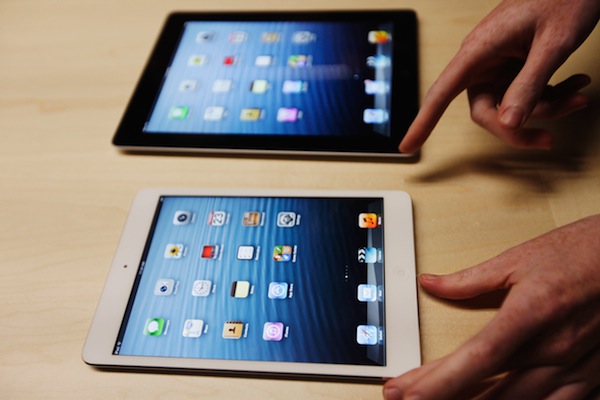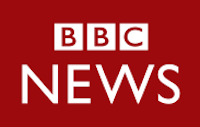
 Two entrants into the tablet market: We got a first look this week at two new devices that should play a big role in shaping the tablet market going forward. The first, the iPad mini, was unveiled at an Apple event which also included announcements of a new iPad, Macbook, iMac, Mac Mini, and iBooks app. BuzzFeed has the quick roundup of all of Apple’s shiny new toys, and Macstories has a pretty good overview of the iPad Mini in particular, while Engadget compared it to its 7-inch tablet competitors.
Two entrants into the tablet market: We got a first look this week at two new devices that should play a big role in shaping the tablet market going forward. The first, the iPad mini, was unveiled at an Apple event which also included announcements of a new iPad, Macbook, iMac, Mac Mini, and iBooks app. BuzzFeed has the quick roundup of all of Apple’s shiny new toys, and Macstories has a pretty good overview of the iPad Mini in particular, while Engadget compared it to its 7-inch tablet competitors.
Reaction from market analysts (rounded up well in this Fortune piece) was generally pretty positive, though tech writers were a bit more skeptical. Several of them noted that Apple has ripped the 7-inch size in the past, with Fast Company’s Mark Wilson arguing that the iPad mini is simply market defense from Apple, rather than its typical iconic product. Likewise, Slate’s Farhad Manjoo praised Apple for getting updated products out so quickly but wondered why Apple’s getting into the 7-inch tablet market in the first place, and whether people will pay a premium for a type of device whose chief virtue so far has been its cheapness.
But Reuters’ Felix Salmon said Apple isn’t actually concerned about its 7-inch competition, because its customers are deciding not which 7-inch tablet to buy, but which iPad to buy. Zach Seward of Quartz reported that Apple will primarily market the iPad mini to women, as a device that can comfortably fit inside a handbag. Meanwhile, Poynter’s Jeff Sonderman said designers will have to decide if the 7-inch size mimics the phone experience, the tablet experience, or is something new altogether.
The second device that made a debut this week was Microsoft’s Surface tablet, which arrives at the opposite end of the tablet market — not somewhere between a phone and tablet, like the iPad mini, but between a tablet and a laptop. Reviews on the whole (summarized here by The Guardian) were pretty negative for Surface. A few highlights: TechCrunch’s Matt Burns said it’s really not a tablet, but a PC (for a post-PC world). The Verge’s Joshua Topolsky asked, “If this device is not as good as (or better than) the best tablet, and not a complete alternative to a laptop — who is this for? What is it supposed to be?”
Gizmodo’s Sam Biddle said Surface holds out the promise of a tablet that’s truly oriented toward getting work done, but isn’t there yet. And in a positive review, Wired’s Mat Honan said Surface is the first tablet that you could use as your only computer.
 BBC’s abuse scandal crosses the Atlantic: The BBC is finding itself engulfed in a child sexual abuse scandal, and the fallout has reached across the Atlantic to The New York Times. The scandal — which surrounds deceased former BBC host Jimmy Savile, who is accused of sexually abusing hundreds of girls — has been buzzed about for weeks in the British press.
BBC’s abuse scandal crosses the Atlantic: The BBC is finding itself engulfed in a child sexual abuse scandal, and the fallout has reached across the Atlantic to The New York Times. The scandal — which surrounds deceased former BBC host Jimmy Savile, who is accused of sexually abusing hundreds of girls — has been buzzed about for weeks in the British press.
Poynter’s Andrew Beaujon has a good quick primer on the case, and The New York Times has a fuller introduction to it, but here’s the gist: An investigative report into Savile by the BBC program Newsnight was killed late last year, and Newsnight editor Peter Rippon’s blog post this month explaining why was called inaccurate by the BBC. This prompted Rippon to “step aside” this week, as the BBC’s investigative program Panorama also ran a critical episode examining Savile’s behavior and the decision to kill the Newsnight report, including the accusation that it was dropped based on pressure from BBC higher-ups. Meanwhile, BBC director general George Entwistle was questioned by Parliament this week and also announced that the BBC is investigating up to 10 other serious sexual abuse allegations against other employees.
So what does this have to do with The New York Times? Well, Entwistle’s predecessor as BBC chief, Mark Thompson, is about to take over as the Times’ CEO. Thompson reiterated to Times reporters that he didn’t know about the Newsnight report until after it had been killed, as Times public editor Margaret Sullivan proposed that “it’s worth considering now whether he is the right person for the job, given this turn of events” and urged for tough Times coverage of the issue.
Times publisher Arthur Sulzberger Jr. reaffirmed his support for Thompson, but Sullivan’s questions raised considerable attention from British outlets such as The Guardian and Reuters, as well as praise from GigaOM’s Mathew Ingram. Thompson, for his part, said he expected and welcomed the scrutiny from the Times and the BBC, though Reuters’ Jack Shafer said he may end up being nailed in the scandal even if he had nothing to do with killing the Newsnight program.
 Is there hope for magazines? The commentary surrounding Newsweek’s announcement last week that it would drop its print edition continued to spill over into this week. Barry Diller, whose IAC owns Newsweek, told analysts that significant cuts would be coming, but that he’d try to make them as spare as possible. There was a bit more optimism about Newsweek’s online-only prospects, as several people offered up possible models for what it might look like as a web publication: The Atlantic from the Columbia Journalism Review’s Sara Morrison, U.S. News & World Report by Erik Wemple of The Washington Post, and Gourmet from j-prof Susan Currie Sivek.
Is there hope for magazines? The commentary surrounding Newsweek’s announcement last week that it would drop its print edition continued to spill over into this week. Barry Diller, whose IAC owns Newsweek, told analysts that significant cuts would be coming, but that he’d try to make them as spare as possible. There was a bit more optimism about Newsweek’s online-only prospects, as several people offered up possible models for what it might look like as a web publication: The Atlantic from the Columbia Journalism Review’s Sara Morrison, U.S. News & World Report by Erik Wemple of The Washington Post, and Gourmet from j-prof Susan Currie Sivek.
The postmortems on Newsweek and its fellow newsweeklies also continued. Michael Learmonth of Ad Age argued that far from complementing Newsweek, The Daily Beast undermined it, saying, “What TDB and its ilk offer — original writing from a few big names mixed with aggregation-with-attitude — turns out for many readers to be a just-good-enough substitute to a newsweekly.” At Vanity Fair, Jim Kelly made the case that Newsweek fell in part because its audience is no longer looking for institutional, authoritative voices on culture and politics.
The Columbia Journalism Review’s Ryan Chittum and Ad Age’s Simon Dumenco both argued that magazines aren’t doing nearly as bad as they’re made out to be. Magazines and online publishers are facing the same difficult ad market, Dumenco said, but magazines have to turn real revenues, rather than simply relying on venture capital. Reuters’ Felix Salmon countered that magazines may be better than startups at throwing off profits, but they’re still a risk, and “the uncertainties of digital ultimately trump the storied legacy of print.” Meanwhile, a couple of other magazines made some digital-centric changes: Time switched to the mobile-oriented responsive design, and MIT Technology Review relaunched as a “digital first” publication.
New newspaper prospects for Murdoch: The Tribune Co. is about to emerge from bankruptcy, and one of the buyers looking at its two biggest newspapers, The Los Angeles Times and The Chicago Tribune, is Rupert Murdoch’s News Corp., according to a report from the Times itself. News Corp. denied the report. Jeff John Roberts of paidContent argued that buying the Times and Tribune wouldn’t make much business sense for News Corp., despite the economy of scale they would provide alongside The Wall Street Journal. Murdoch would need to add revenue streams in a hurry with those papers due to the impending spinoff of News Corp.’s news properties, Roberts wrote.
At the Lab, Ken Doctor argued the opposite — News Corp.’s coming news/entertainment split makes it easier to buy those papers, not harder. With it, he said, Murdoch can go back to focusing on acquiring papers as political capital, as he’s done for decades, and the bankruptcy offers a bargain-basement price. Elsewhere on the News Corp. front: There are now allegations that its papers weren’t the only ones involved in hacking people’s phones — complaints have been filed against papers from its rival, Trinity Mirror.
Reading roundup: Here’s what else has been going on in media and tech this week:
— The New York Times Co. reported a surprising loss for the last quarter stemming from lower-than-expected ad revenues, prompting a steep drop in its stock price. GigaOM’s Mathew Ingram critiqued the Times’ online revenue strategy, and paidContent’s Jeff John Roberts asked a few questions about its future.
— A few political media notes as we near the home stretch of the American election season: At The New York Times, Thomas Edsall argued that Mitt Romney could be paving the way for secrecy (especially toward the press) to become the norm in presidential campaigns. President Obama’s campaign released the transcript of an off-the-record conversation with The Des Moines Register editors after they publicly complained that they wouldn’t allow the talk to be on the record, though The Washington Post’s Erik Wemple was skeptical about the episode. And Poynter’s Amanda Hess wrote a thoughtful piece on reporting on memes.
— Norwegian media commentator Martin Bekkelund wrote of a friend who had all of her Amazon Kindle books deleted by Amazon without warning or, really, explanation. Simon Phipps found the backstory (she bought a Kindle in one country and ended up transferring the account to another Kindle she bought in another country). Amazon restored her ebooks, but not before BoingBoing’s Cory Doctorow, Techdirt’s Mike Masnick, and GigaOM’s Mathew Ingram condemned its actions.
— Poynter held a workshop in New York this week on digital ethics; you can see videos and a Storify of it on Poynter’s site. Social media researcher Danah Boyd published her talk on fear in an attention economy in essay form on Poynter, and Craigslist founder Craig Newmark published his at The Huffington Post. Forbes’ Jeff Bercovici disagreed with him, and GigaOM’s Mathew Ingram also wrote about the panel.
— Finally, a couple of interesting Pew studies released in the last week: One on social media and political engagement, and one on young people’s reading habits.
Photo from John Bradley/Wired used under a Creative Commons license.